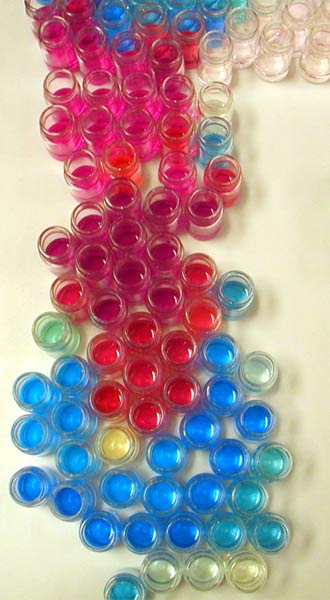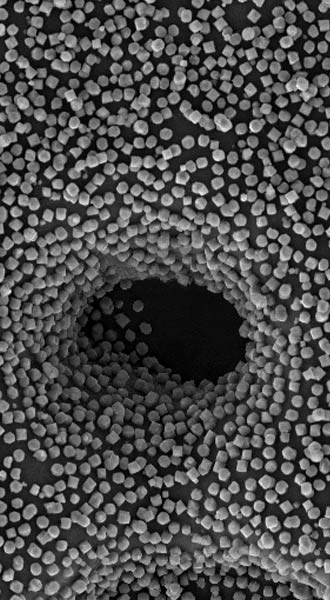Molecular probes.
• Sensors and molecular probes for the electro-chemical or chromo-fluorogenic recognition of anions, cations and neutral species of interest.
The IQMA has developed molecular chemical sensors (molecular probes) where the recognition process is connected to a signalling process. This behaviour is obtained of transducer units by means of the introduction of transductor units in the ligand (or reagent site) able to transform the information of the molecular recognition process in a change in his physical properties (for example optical or electrochemical). This one is a relatively new area with an increasing importance inside the supramolecular chemistry area.
These research lines intend develop to new chemical probes of molecular basis. As noted above, these works have a component of basic research, though some recent results have been protected by patents due to its potential utility like sensor systems for the determination of chemical species of environmental interest (for example mercury, cyanide, etc.) and / or biological (for example cystein, ATP, etc.).
Between the potentials of this line there is the development of colorimetric methods based on molecular probes for the fast and simple detection of explosives, drugs and agents used in chemical war.
In relation to the electrochemical molecular probes, the IQMA has worked basically with ferrocene as signalling unit for coordination events. We carried out the preparation and characterisation of compounds and the study of the influence of coordination in the redox potential of the active group.
Besides the use of ferrocene as signalling unit, we have also focused on optical signalling, by means of coordinanting chromo-fluorescent systems. They show the advantage of developing naked-eye detection systems. In this area the I.Q.M.A was one of the first European groups in beginning a wide research effort becoming a national and international referent.
• New sensors material (a nano-supramolecular approximation).
The IQMA has designed novel colorimetric-fluorometric recognition protocols using nanoscopic solids together with supramolecular chemistry concepts in order to increase the selectivity and applicability of the designed systems. These sensor systems are formed by biomimetic cavities (remembering biological systems like enzymes and proteins) obtained by means of a suitable surface functionalisation, with different organic groups of certain preorganized mesoporous solid. These hybrid material sensors offer synergies producing new selectivity impossible to obtain with molecular systems in solution.
This work is developed due to the presence in the Institute of Applied Molecular Chemistry of experts in inorganic synthesis of new meso and microporous materials. From a basic point of view, some aspects related to the porous materials as the size control, form and regularity of pores are key parameters to evolve from potential uses to real applications. The scientific and technological interests of this porous solid are based on their capacity to interact with atoms, ions and molecules within all the material porous.
This research shows that combinations of surface coordinating molecules (hybrid systems) offer functional cooperative supramolecular behaviours such, processes of chemical amplification difficult to observable or attain in molecular analogous. This chemical amplification can be observed for example in hybrid systems where the molecular superficial preorganisation increases the efficiency of the coordination and recognition chromo - fluorogenic processes.
The key to jump towards more complex functional systems is related to the dimensionality. So, the anchorage of specific molecular entities not on flat surfaces (2D systems) but in nanoscopic 3D architectures (for example mesoporous) offers the opportunity to develop and explore new functional supramolecular concepts such as the hybrids material bio-mimetic development and use applied to the development of new chromo - fluorogenic recognition protocols. In this line the I.Q.M.A uses known tools (organic, inorganic synthesis, anchorage processes, auto-assembly supramolecular processes, nanoscopic ideas, etc) to construct organic-inorganic hybrid materials and study, understand and design new functional cooperative supramolecular processs in relation to the development of chemical molecular sensors.
| 
 |